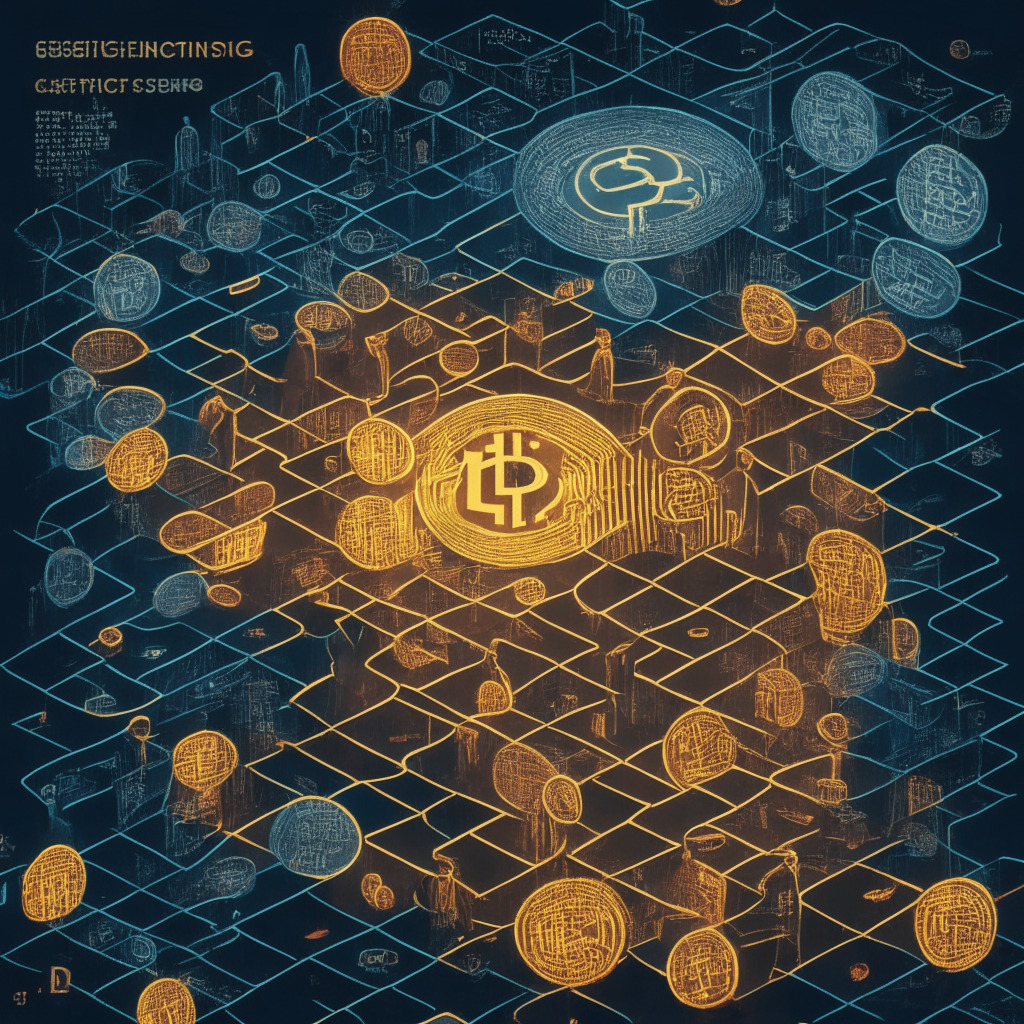In a Cointelegraph interview, Kevin O’Leary discussed potential serious charges against Binance and its CEO amid allegations from the SEC. He emphasized the need for greater transparency, established regulation, and investing in regulated exchanges for crypto industry growth and stability.
Search Results for: KYC
DeFi’s Delicate Dance with Regulations: Balancing Growth, Innovation, and Compliance
This article discusses the need for decentralized finance (DeFi) to comply with regulatory requirements in order to grow, attract capital, and become a trusted financial solution. It highlights the importance of working with regulators, while maintaining DeFi’s unique characteristics and benefits, to navigate the challenges of compliance and potentially redefine the future of financial services.
Crypto Firms Boost Legal Hires Amid SEC Scrutiny: Compliance and Blockchain’s Future
Amid increased regulatory scrutiny in the US, crypto companies are emphasizing legal hires, investing in compliance teams, and working with law enforcement to address concerns. This comes after recent SEC lawsuits against Binance and Coinbase, prompting a push for better compliance and potentially leading to improved practices and broader technology adoption.
Navigating the Tightrope: Balancing Crypto Regulation and Innovation
The recent SEC lawsuit against major crypto exchanges marks a significant escalation in regulatory scrutiny, stemming from concerns like scams, money laundering, and tax evasion. Balancing consumer protection with innovative advancements is crucial for the future trajectory of the digital asset market.
Binance Faces Class-Action Lawsuit Over Stolen Crypto: Examining the Implications and Future of Regulation
Binance faces a class-action lawsuit for allegedly profiting from transactions involving stolen cryptocurrency. Plaintiff Michael Osterer claims that Binance failed to verify lawful ownership of 7.2 BTC and 449 ETH stolen from his Coinbase account, and suggests that the exchange willingly facilitates money and cryptocurrency laundering on its platform. The lawsuit could have significant implications for the crypto economy and future regulations.
SEC Lawsuits Against Crypto Exchanges: Compliance Battle or Decentralization Catalyst?
The SEC’s recent lawsuits against Binance and Coinbase raise questions about the future of crypto exchanges. As regulatory enforcement tightens over concerns regarding compliance, transparency, and customer protection, the effects on the crypto landscape may be far-reaching, with centralized exchanges possibly having to adopt more stringent KYC protocols and resemble fintech firms and banks.
Groundbreaking Crypto Payments Pilot by Russian Megabank: Pros, Cons, and Main Conflicts
Russian megabank Rosbank, in partnership with B-Crypto, has launched a groundbreaking cross-border crypto payments pilot, streamlining international transactions for companies. The initiative encounters potential roadblocks, such as liquidity concerns and varying global stances on digital currency regulation, making the future of cross-border crypto payments uncertain.
Exploring CBDC Potential in China’s Greater Bay Area: Transforming Commerce & Cross-Border Trade
This joint white paper by Standard Chartered and PwC China explores the potential applications of central bank digital currencies (CBDCs) in China’s Greater Bay Area, highlighting advantages like streamlined supply chains, invoice settlements, and loyalty programs. CBDCs could transform commerce and enhance Know Your Customer processes, but widespread adoption requires collaboration and adaptation.
Giddy Wallet and Bitrefill Integration: Pros, Cons, and Conflicts in Crypto Yield Spending
Self-custody wallet Giddy partnered with Bitrefill, enabling users to pay for everyday items using cryptocurrency yield. The integration connects crypto and blockchain with real-world purchases and allows access to DeFi lending pools and protocols for generating yield without touching initial deposits.
DeeLance: Challenging Centralized Freelance Platforms with Crypto-Powered Metaverse
DeeLance, a Web3 freelance metaverse platform, raised $1.2 million through its $DLANCE token sale, aiming to challenge Fiverr and Upwork with its decentralized, NFT-powered platform. DeeLance intends to solve copyright infringement, payment fraud, and other issues by leveraging blockchain technology, offering secure and transparent freelance work opportunities for all users.
Introducing Fireside Forum: Pi Network’s Decentralized Social Platform Revolutionizing Content Value
The Pi Network has launched Fireside Forum, a decentralized social platform that uses Pi token cryptocurrency to enhance content quality and user accountability. By requiring users to pay in native cryptocurrency, the platform aims to regulate online behavior and encourage meaningful interactions, thus addressing issues like misinformation and trolling faced by traditional social networks.
Binance Denies Layoffs Amid Growth: Balancing Talent Density and Regulatory Compliance
Binance denies cutting 20% of its staff, instead emphasizing its exponential growth and cyclical talent density audits. The company faces regulatory scrutiny from the CFTC, IRS, and federal prosecutors over crypto derivatives and inadequate AML/KYC adherence, highlighting tensions between market growth and regulatory compliance.
Social Media Influencers Receive ETH for Nothing: Publicity Stunt or Money Laundering?
A recent trend on Twitter involves influencers asking for Ethereum (ETH) in exchange for nothing, raising questions about publicity stunts or potential money laundering. One wallet address received over $1 million worth of ETH in 24 hours. The trend underscores potential risks within the evolving cryptocurrency space, emphasizing the necessity for investor diligence and education.
Exiting Canada: Bybit’s Move Sparks Crypto Regulatory Compliance Debate
Bybit is pausing its services for Canadian users due to recent regulatory developments in the country. The Dubai-based platform will stop accepting account opening applications from Canadian nationals or residents starting May 31. As Bybit exits Canada, it expands into other markets like Kazakhstan, highlighting the increasing importance of regulatory compliance for crypto firms.
Binance’s Japanese Platform Launch: Compliance, Limitations, and Adoption Impact
Binance plans to transition Japanese users to a specialized local platform compliant with national regulations this summer. This move highlights the ongoing challenges and opportunities within the rapidly-evolving regulatory landscape for cryptocurrencies, ultimately paving the way for increased adoption and trust in the global market.
Binance Japan Launch: Compliant Trading vs Innovation in Crypto Regulation
Binance discontinues crypto services for Japanese residents by November 30, 2023, to comply with regulatory standards. Binance Japan, a dedicated local platform, will launch in summer 2023, offering a compliant trading experience with local fiat support.
Exploring the First BRC-20 Stablecoin: StablyUSD’s Controversial Launch and Implications
The first BRC-20 stablecoin, Stably USD, has been introduced to the Bitcoin ecosystem, sparking debate among prominent figures. Stably, a U.S.-based company, promotes this dollar-backed stablecoin. However, red flags exist, including an unfeasible total supply and discrepancies in registration data. The future of this BRC-20 stablecoin remains uncertain.
Zero-Knowledge Compliance Tools: Balancing Privacy and Regulation in DeFi and Web3
Etonec partners with Mina Foundation to develop a zero-knowledge proof-powered regulatory compliance tool for the DeFi and Web3 markets. This solution will maintain user privacy while addressing KYC and AML regulations, potentially attracting more institutional investors and providing unprecedented data control for users.
Bitpanda and Coinbase Partnership: Exploring Opportunities and Regulatory Challenges
Bitpanda partners with Coinbase to secure a licensing agreement making Coinbase a liquidity provider for Bitpanda Technology Solutions. The collaboration offers a scalable Investing-as-a-Service infrastructure for institutional clients like banks and financial institutions outside the U.S, while facing potential increased regulatory scrutiny.
PepeDerp Craze: Unreliable Meme Coin or Hidden Gem? Pros, Cons & Safer Alternatives
Meme coin PepeDerp raises concerns about its reliability due to its smart contract’s potential risks and lack of audits or whitepapers. Meanwhile, alternative meme coin investments like AiDoge, Ecoterra, and yPredict offer genuine utility and unique features. Conduct thorough research before investing.
Worldcoin’s Iris Scanning: Ensuring Uniqueness or Compromising Privacy?
OpenAI CEO Sam Altman has secured $115 million in Series C funding for Worldcoin, a cryptocurrency project focused on the Worldcoin token and decentralized World ID. The project aims to distribute tokens based on individuals’ unique statuses, using iris scans for identity verification. However, privacy concerns and potential safety risks have drawn criticism.
Stably USD Stablecoin’s Impact on Bitcoin Trading: Potential Game Changer or Just Hype?
The new dollar-backed stablecoin, Stably USD, designed for the on-chain Bitcoin economy raises questions about the future of digital asset trading. Developed by crypto startup Stably, this BRC-20 token aims to simplify trading in ordinals, offering a more efficient and cost-effective alternative to fiat currency or Bitcoin. Skepticism remains whether it will significantly impact the market.
Ledger’s Controversial Seed-Recovery Service: Security Concerns and Open-Source Solution
Ledger’s new seed-recovery service received criticism for security concerns, prompting the CEO to announce changes, including open-sourcing the Ledger Recover code, and adding passphrase protection. However, not all firmware will be open-sourced, and users must still trust the manufacturer for crypto safety.
Manta Network and Linea’s zkSBT: Enhancing Privacy in Crypto & Blockchain Applications
Manta Network partners with Linea to introduce zero-knowledge soulbound tokens (zkSBT) to maintain user privacy on blockchain platforms. The collaboration aims to provide decentralized, trustless, and private identity verification for various applications without compromising on-chain activity data or requiring KYC screenings.
Crypto Hacks Decrease by 70%: Hackers Return Stolen Funds for White Hat Rewards
Crypto hacker exploits have declined by 70% in Q1 2023, with hackers increasingly returning stolen funds for “white hat” rewards, says a TRM Labs report. Increased regulatory attention, robust KYC/AML policies, and successful enforcement cases are contributing factors to this shift.
BitMEX Hong Kong: Embracing Compliance or Compromising Security? Pros and Cons Explored
BitMEX Hong Kong is designed to comply with the upcoming Virtual Asset Service Provider (VASP) regime, set for May 2023. Users will transition to HDR BMEX Limited and use the dedicated BitMEX Hong Kong app, offering greater portfolio control and streamlined user experiences.
RFK Jr’s Bitcoin Stance: Protecting Privacy or Inviting Misuse and Energy Debates?
Presidential hopeful Robert F. Kennedy Jr. embraces Bitcoin, advocating for protection from invasive surveillance and governmental control at the 2023 Bitcoin Conference. He criticizes proposed energy tax on Bitcoin miners and supports decentralized systems for cryptocurrencies and democracy.
Binance’s Latam Gateway License in Brazil: Opportunities and Regulatory Challenges
Latam Gateway, a payment provider for Binance in Brazil, recently received a license to operate as a payment institution and electronic money issuer. As the collaboration between Latam Gateway and Binance grows, Brazil faces challenges in implementing proper oversight and consumer protection measures while fostering innovation in the evolving crypto market.
Ledger’s Key-Recovery Feature: The Privacy, Security, and Trust Dilemma in Crypto Wallets
Ledger’s new key-recovery feature, Ledger Recover, faces criticism as opponents argue it undermines the inherent security of hardware wallets. Privacy concerns arise since identities are linked to crypto wallets, and trust issues persist due to Ledger’s closed source code. The feature attempts to balance cold storage autonomy with custodial storage convenience, but increased security risks make its adoption uncertain among sophisticated users.
Ledger Recover: A Reckless Security Risk or Innovative Seed Phrase Solution?
Ledger’s latest update, Ledger Recover, allows users to opt-in to recover private seed phrases with encrypted portions sent to third parties. Critics argue security risks while Ledger claims it improves traditional storage practices. The crypto community should focus on facts when assessing security innovations.
Binance Australia Loses PayID Access: What It Means for Users and the Future of Crypto Exchanges
Binance’s Australian branch has lost its PayID deposit service due to a decision by its third-party payment provider, reportedly Cuscal. This affects bank transfer withdrawals and comes after the Australian Securities and Investments Commission canceled Binance’s derivatives license. The exchange is facing investigations by multiple U.S. government agencies.
Crypto Wallet Wars: Ledger Recover Controversy and Competitors Capitalizing on Privacy Fears
Ledger faced backlash after introducing Ledger Recover, raising concerns about closed-source firmware and data leaks. Competitors Blockstream, Trezor, Cold Card, and BitBox slashed prices, emphasizing privacy and self-custody. The situation highlights trust, privacy, and user preference when choosing crypto wallets.































